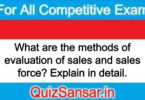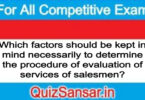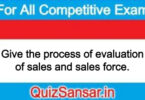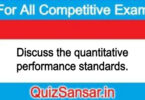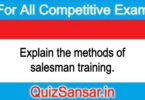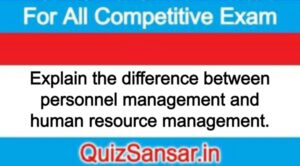
Explain the difference between personnel management and human resource management.
Explain the difference between personnel management and human resource management.
Ans.
Difference between Personnel Management and Human Resource Management
1. Personnel management (PM) concepts emphasize clearly defined rules, procedures and courses. These rules and customs govern the actions of the management. The relationship between the work force and the management is governed by employment contracts and collective bargaining. Collective bargaining becomes significant because employees and management see and treat each other as having divergent interests. In PM, plularism, that is men having different views is respected as a social value and the role of the union is legitimate. On the other hand in HRM, open ended contracts, the terms of which are linked to the exigencies of business, and conflict is viewed as the result of negative inter-personal relations rather than structural contradictions.
2. PM does not focus on strategic management. Its main goal is peaceful or good labour-management relations. Its function is mainly reactive. On the other hand, HRM is a proactive function. HRM is not only concerned with the present organizational needs but anticipates future needs and seeks to release the inner potential and creativity of people.
3. The temple of PM is built on collective agreement between the employees and management. Employees get standardized rewards based on job evaluation. But HRM leads to individualization of collective relations. Pay is linked with contribution made by the employee to the relation of organizational goal. HRM seeks to develop the competencies of the employees so as to derive benefit from this development for the organization, and to integrate individual and organizational goals. Skill formation and developments are recognized as the main hallmarks of HRD.
4. PM is a routine maintenance oriented administrative function; HRM places emphasis on a continuous development of people at work.
5. PM is seen as independent function and sub-functions without giving due regard to organizational strategies and processes. But HRM is viewed as a sub-system of the organization. Therefore, it takes into account its linkages and interfaces with all other parts of the organization.
6. PM takes a narrow view of its scope and objectives. It concentrates mainly on improving the efficiency of personnel in isolation of the organizations. But HRM takes a systems view and attempts not only in making people efficient but also in creating proper organizational culture.
7. PM emphasizes on economic rewards and traditional design of job simplification for motivating people for better performance. HRM emphasizes on the satisfaction of higher needs of motivating people, autonomous work group, challenging jobs and creativity.
8. PM considers job satisfaction and morale as cause of improved performance. It works on the basis that a happy worker is a productive worker. The emphasis of HRM is the other way round. It is based on the premise that better performance itself is a so of satisfaction and high morale.


